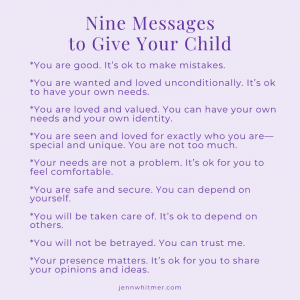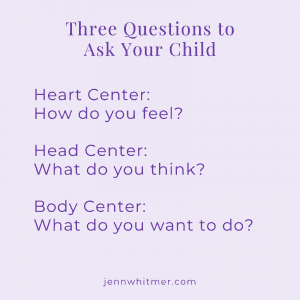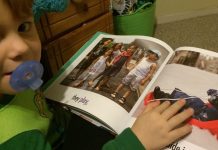Former educator, certified Enneagram coach, and mom of four, Jenn Whitmer helps us discover how to positively shape our child’s personality as she explores The Enneagram and Kids.

I misplaced the user’s manual they gave me when our kiddos came home with me. And I promise I didn’t get one for parenting in a pandemic.
It would be so nice to flip to a page with step-by-step instructions for raising our kids—even IKEA style! Especially with just SO. MUCH. TOGETHERNESS. It’s one reason why we want to figure out kids’ personality types. Because it gives us some guidance and a little how-to for raising these humans!
The Enneagram gives us wonderful insight for living whole, connected lives. The Enneagram is a personality framework with nine core types identifying what motivates our behavior. It observes and reflects our inner world without judgment, but it also offers paths for growth.
When I talk about the Enneagram and parenting, there are two big ideas: be the healthiest you can be in your number, and your child is developing a personality that doesn’t need to be “fixed.” Keep those ideas before you as you dip your toes into the Enneagram.
Clearly, this is a topic that spills over the banks of one blog post. We’re keeping it simple today with just one don’t and two dos!
Don’t type your kids.
Sorry, friends, we can’t type our kids. Children grow into their personalities through high school. There are absolutely elements of personality you can discover as early as preschool, and many more preferences are pretty clear by age 10. However, the Enneagram framework recognizes the development of personality isn’t finished before 17-years-old.
This is for a couple of reasons. First, the Enneagram is about motivation, the why you do what you do. If you’ve ever asked a 9-year-old, “Why did you do that?” and received a blank stare, you understand the purpose in waiting until there’s a smidge more awareness of their inner world before jumping into the Enneagram.
Next, we don’t type other people. I tell my clients repeatedly, a test doesn’t type you. Your friends don’t type you. Even as an Enneagram coach, I don’t type you. That’s your work to discover. So as parents, be careful we don’t put something on our kids that is our perception and not their inner reality.
Do reinforce these nine messages.
Personality develops a bit like a story, as a way to make sense of the world. Children are developing intuition, logic, and emotional patterns that grow into their personality structure. In all this sorting and figuring out, each child is looking for a unique message from their caregivers, one that wiggles its way down into their souls. In the midst of training our kids to mute themselves on zoom, reinforce these messages, too.
You are good. It’s ok to make mistakes.
You are wanted and loved unconditionally. It’s ok to have your own needs.
You are loved and valued. You can have your own needs and your own identity.
You are seen and loved for exactly who you are—special and unique. You are not too much.
Your needs are not a problem. It’s ok for you to feel comfortable.
You are safe and secure. You can depend on yourself.
You will be taken care of. It’s ok to depend on others.
You will not be betrayed. You can trust me.
Your presence matters. It’s ok for you to share your opinions and ideas.
Noticing which message your child really soaks up can give you clues to their personality. We can’t protect our kids from hurt and sensitivity. But, weaving these messages into our words and actions will encourage the personality to develop in healthy ways.
Do ask three types of questions.
We all have three centers of intelligence: our body or instincts, our hearts, and our minds. We develop one as our dominant or strongest intelligence, and we have a second one as our other high-functioning intelligence. The third one, we repress. Often, we repress the center of intelligence that was injured or just didn’t work well for us growing up. As adults, we have to learn to exercise that repressed center.
This will still happen for your child. But, your influence now can encourage the centers to grow more equally. Ask:
What do you think about that?
How do you feel about that?
What do you want to do about that?
These questions encourage your child to practice exercising each center of intelligence. By listening to your child’s answers, you’ll identify which type of intelligence your child uses easily and which one they don’t use as often. This will give you more clues into their emerging personality.
We have so much influence in helping our children develop in healthy and whole ways. As much as we might like an IKEA pamphlet about our child, there is joy in walking alongside as they become their own person.
 Jenn Whitmer helps leaders and teams work through conflict, improve communication, and gain self-awareness through the Enneagram so they can have healthy relationships and do powerful work. She is a speaker, writer, certified Enneagram coach, and all-around joy-bringer. She and her husband, Michael, moved as newlyweds from Kansas City to St. Louis more than 20 years ago to begin her teaching career. They now live in Clayton, but she still can’t answer the question, “What high school did you go to?” Michael and Jenn have two sons aged 17 and 16 and two daughters, 14 and 11. Three ago, Jenn moved from the world of early childhood and elementary education to speaking and coaching. She loves helping people through workshops and coaching. You can find her at jennwhitmer.com or probably laughing too loudly with a friend.
Jenn Whitmer helps leaders and teams work through conflict, improve communication, and gain self-awareness through the Enneagram so they can have healthy relationships and do powerful work. She is a speaker, writer, certified Enneagram coach, and all-around joy-bringer. She and her husband, Michael, moved as newlyweds from Kansas City to St. Louis more than 20 years ago to begin her teaching career. They now live in Clayton, but she still can’t answer the question, “What high school did you go to?” Michael and Jenn have two sons aged 17 and 16 and two daughters, 14 and 11. Three ago, Jenn moved from the world of early childhood and elementary education to speaking and coaching. She loves helping people through workshops and coaching. You can find her at jennwhitmer.com or probably laughing too loudly with a friend.













This is such great advice! I love your insight about the nine things to reinforce – that’s definitely something I can start doing today!
Comments are closed.